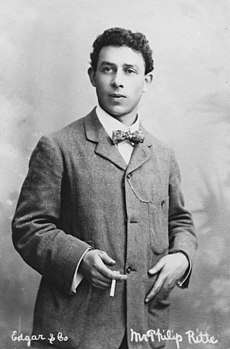Philip Ritte
Philip Ritte (8 January 1871 – 14 December 1954) was a British tenor of the early 20th century. He made his stage debut in London's West End singing in Gilbert and Sullivan and other comic operas and musicals. He went on to enjoy great popularity as a concert singer of ballads during the Edwardian era and the First World War, and also as a performer in concert parties at The Oval, Margate in Kent. He made a number of recordings.

Early years and personal life
Philip Ritte was born in Edinburgh in 1871 as Philip Rittenberg, the son of Bernhard Rittenberg (of Lithuanian Jewish descent) and Bertha Wasserzug (of Polish Jewish descent).[1][2] He was one of seven children.[2][3] He was educated at Cowper Street School in London, and studied art before moving on to study music.[1] In 1899 he married Henrietta Helena "Lillie" Latte; his profession at this time being given as that of a lithographic artist on the marriage certificate.[2][4] They had four children.[2] In 1918 he changed his name to Philip Ritte.[2]
Stage and singing career
Ritte made his singing debut as a chorister with the D'Oyly Carte Opera Company at the Savoy Theatre from June 1899 to November 1901, beginning with H.M.S. Pinafore and Trial by Jury and ending with the original production of The Emerald Isle.[5][6] From 1903 to 1904 he played a small part (the First Watchman) in The Cherry Girl at the Vaudeville Theatre in London.[1][5] From 1904 and for eight years he made annual appearances at the London Ballad concerts held at both the Queen's Hall and Royal Albert Hall.[1] He performed in numerous concerts at most of the leading provincial British theatres.[1] In 1907 he joined "Randall Jackson's Concert Party" at the Oval in Margate in which he had Hugh E. Wright, Carrie Tubb and Fred Wildon as fellow artists, and it was this association which gained him his eventual popularity.[7] For several summers Ritte ran his own companies in the Worthing, Westgate and Swanage areas of the south coast of England.[7] In 1912 the Ariel Grand record catalogue made the following appraisal of his career:[6]
Since his first appearance as a member of the D'Oyly Carte Opera Company, twelve years ago, Mr. Ritte's career has been an uninterrupted success. He has appeared before enthusiastic audiences in all the principal London concert halls and is well known in oratorio in the largest provincial centres.
Recordings
In 1909 Ritte recorded fewer than ten songs for HMV's Zonophone label.[8] Between 1910 and 1911 he made a number of recordings for Pathé.[9] He recorded about seven discs for Beka records,[10] and had nineteen entries in the 1912 Ariel Grand record catalogue.[6] He also recorded for the Albion and Coliseum labels. He used the pseudonym Harold Harmsworth for some of his recordings. A selection of his songs, with recording date (where known) and record company is given below:
- "I'll Take You Home Again, Kathleen", 1909, Zonophone[8]
- "When You and I Were Young, Maggie", 1909, Zonophone[8]
- "Love's Old Sweet Song", 1909, Zonophone[11]
- "The Golden Shore", 1909, Zonophone[11]
- "I Hear You Calling Me", 1910, Pathé[9]
- "Because", Albion
- "Roses of Picardy", Coliseum
- "Kathleen Mavourneen", Beka[10]
In 1927, he made a short film Philip Ritte and His Revellers in the short-lived DeForest Phonofilm sound-on-film process.
References and notes
- Who's Who in Music, Ed. H. Saxe Wyndham, Boston, Small Maynard and Co., 1913, p. 175
- Website detailing the Rittenberg family history. Accessed 27 Apr 2013
- His sister Eugenie (born 1881) studied at the Royal Academy of Music and became a successful soprano; she made a small number of recordings.
- British General Register Office – Marriage certificate: 1899 vol. 1A page 1513; Death certificate: 1954 vol. 5F page 233. Payment required.
- Stone, David. Joseph Ritte (and Philip Ritte), Who was who in the D'Oyly Carte Opera Company, 14 April 2003, accessed May 27, 2016
- Ariel Grand Double-Sided Record Catalogue, Ariel, 1912 – Career appraisal
- The Stage, 23 Dec 1954, p. 7. Death announcement.
- The AHRC Research Centre for the History and Analysis of Recorded Music. Accessed 27 Apr 2013
- Girard and Barnes, Vertical-Cut Cylinders and Discs, British Institute of Recorded Sound, 1971, p. 124
- Complete catalogue of Beka Double-Sided Disc Records, Reprint, No date or publisher given (probably 1970s or 1980s), p. 12
- http://sounds.bl.uk/related-content/TEXTS/029I-ZONXX1913X14-0000A0.pdf p.46